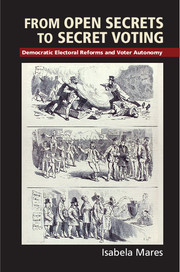Book contents
- Frontmatter
- Contents
- Figures
- Tables
- Acknowledgments
- 1 Introduction
- 2 The Protection of Voters' Autonomy
- 3 Electoral Intimidation by State Employees
- 4 Electoral Intimidation by Employers
- 5 The Production of Irregularities during Elections: A Quantitative Analysis
- 6 The Adoption of Electoral Reforms
- 7 Labor Scarcity, Rural Inequality, and Electoral Reforms: The Determinants of Electoral Reform in the Prussian Electoral System
- 8 Voting for Opposition Candidates: Economic Concentration, Skills, and Political Support for Social Democracy
- 9 Dilemmas on the Right and the Road to Proportional Representation
- 10 From Macro- to Micro-Historical Analysis in Comparative Research
- References
- Index
- Other Books in the Series
3 - Electoral Intimidation by State Employees
Published online by Cambridge University Press: 05 July 2015
- Frontmatter
- Contents
- Figures
- Tables
- Acknowledgments
- 1 Introduction
- 2 The Protection of Voters' Autonomy
- 3 Electoral Intimidation by State Employees
- 4 Electoral Intimidation by Employers
- 5 The Production of Irregularities during Elections: A Quantitative Analysis
- 6 The Adoption of Electoral Reforms
- 7 Labor Scarcity, Rural Inequality, and Electoral Reforms: The Determinants of Electoral Reform in the Prussian Electoral System
- 8 Voting for Opposition Candidates: Economic Concentration, Skills, and Political Support for Social Democracy
- 9 Dilemmas on the Right and the Road to Proportional Representation
- 10 From Macro- to Micro-Historical Analysis in Comparative Research
- References
- Index
- Other Books in the Series
Summary
The authority of the state is powerful in the hands of each person, also in the hands of the last night watchman and policeman.
(Eduard Lasker, Stenographische Berichte des Reichstages April 17, 1871)This chapter begins the empirical investigation of the production of electoral irregularities in German elections by analyzing the variation in electoral irregularities perpetrated by employees of the state. Electoral intimidation by state employees was pervasive in German national elections. The majority of the petitions submitted to the electoral commission of the Reichstag invoked electoral irregularities committed by employees of the state (Klein 2003). The ubiquitous presence of state employees as well as the brutal nature of their harassment and intimidation of voters added an unusually harsh character to nineteenth-century German elections. The identities of the employees of the state that supplied electoral services to politicians varied significantly across German regions. In Prussia, Landräte and policemen played a pervasive role in elections. The former cumulated important political responsibilities, serving as both the collectors of taxes (and assessors of tax liabilities) and making decisions on who was conscripted into the Prussian army. In Saxony, a region that experienced very high levels of electoral irregularities, policemen were ubiquitous in elections. By contrast, in southern German states such as Baden or Württemberg, where the electoral intervention by public employees was lower, mayors were the actors who occasionally trespassed against the provisions of the electoral law and engaged in the electoral intimidation of voters.
I begin this chapter by developing a number of hypotheses about the political considerations of politicians and employees of the state, and the incentives for the former to demand and the latter to supply electoral services conflicting with the provisions of the electoral code. In particular, I examine the relationship between political competition and the production of intimidation in German national elections.
- Type
- Chapter
- Information
- From Open Secrets to Secret VotingDemocratic Electoral Reforms and Voter Autonomy, pp. 40 - 66Publisher: Cambridge University PressPrint publication year: 2015

